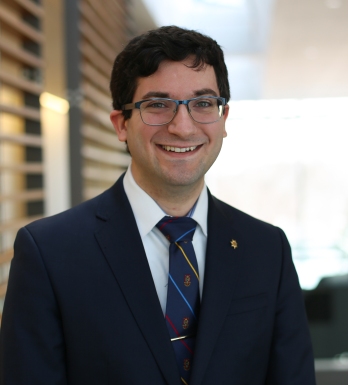The Research/Project Spotlight initiative features emerging research and projects conducted by CERA’s graduate students. The spotlight initiative further the mission and goals of the association by providing a structured means to enhance the visibility of the association, support the work of its members, and support knowledge mobilization efforts to better communicate research efforts and findings to the broader education community.
Eleftherios Soleas (Queen’s University; 2020 David Bateson Award winner)

Title of Project: Development of the Motivation to Innovate Inventory: An Inclusion-focussed Interdisciplinary Innovation Promotion Research tool
Research Questions: This instrument development study adds to the tools available to decision makers and teachers to help inform promotion of innovative behaviour by providing:
- An instrument that addresses the specifically missing ability to gainfully assess the motivation to innovate of a multidisciplinary sample of individuals;
- A tool that elucidates the promotive and hindering factors at play in their motivation to innovate;
- An instrument with demonstrated factor integrity in diverse samples more closely aligned with the realities of today’s learning and work environments.
This instrument provided the means to gather wider insight beyond my interviews and systematic reviews.
Project Description: There has been a surge in recent literature recognizing the importance of discovering the motivations of innovators as a means of promoting this necessary source of renewal. At present, however, this wave has not yet yielded an instrument that assesses the supporting and hindering motivational dynamics underpinning innovation at the levels of individuals. In the face of this lingering need, this instrument development study used qualitative and quantitative methods including a systematic literature review, 30 interviews with existing Canadian innovators followed by expert consultations and think aloud protocols before being administered to Canadian innovators as a survey. After administration, exploratory (n=227) and confirmatory factor analyses (n=500) were performed to refine and then evaluate the psychometric properties of the instrument. This yielded an inclusive, psychometrically-sound inventory useful in multiple disciplines to assess the factors impacting motivation to innovate across educational and workplace contexts. It was developed with the critique and support of expert scholars and innovators to be useful for individual innovators, decision-makers, and educators as they consider reforms to existing practices to promote innovative behaviour.
Next steps for this project: This manuscript was the first in the four that make up my dissertation with my systematic review split into two more manageable reviews currently under consideration for publication. I hope to use the instrument as the foundation for interventions and I’d be delighted to work with folks with ideas for how to use.
CERA’s impact on Eleftherios Soleas’ work: Like many of you, I was looking forward to attending CERA’s program as well as wider involvement in CSSE. They certainly made the right call, but it still makes me sad that cancelation of CSSE was necessary. CERA puts on a great program, but my favourite have always been the stellar Pre-conference workshops. Two years ago was Dr. Amin Mousavi’s Structural Equation modelling workshop which helped me design my study. Last year was Dr. Okan Bulut’s visualising data workshop which helped me devise a few of the knowledge translations of my work. It was at a CERA event (at my first CSSE) that I first met my late supervisor, Dr. John Freeman and his best friend and my Quant mentor Dr. Don Klinger. I’m sad this year’s conference was cancelled, but I’m looking forward to next year and what I’ll learn next from CERA’s enthusiastic members.